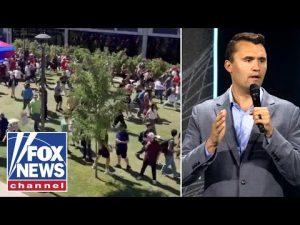In a tragic incident that has rocked the DMV area, Takara Thompson, a young woman who was simply trying to return home after a long day at work, lost her life at the hands of an illegal immigrant. This heartbreaking story has stirred up emotions and prompted discussions around crime, immigration, and public safety. Many community members are left asking why such an incident doesn’t get more media coverage and are urging for a national conversation about the pressing issues that threaten public safety.
The situation has reignited debates on how to ensure the safety of citizens, especially in urban environments where crime rates have been climbing. A local conservative commentator emphasized the need to separate politics from the fundamental question of safety. This person pointed out that Americans should not have to worry about the safety of their public transportation systems or fear for their lives when commuting, particularly at night. The commentator urged that tax dollars should not support transportation systems that do not prioritize the security of commuters.
Transportation Secretary Sean Duffy highlighted that federal funding for cities should be reconsidered if they fail to protect their residents. The notion is simple: if a city cannot ensure that a young woman can ride a train safely, then why should the government funnel resources into that city? Lack of public safety should not be tolerated, and there is a clear call for consequences if local governments do not take decisive action. Cities that prioritize progressive politics over public safety could find their federal funds on the chopping block.
The discussion also touched upon the broader implications of public safety in urban settings across America. It was pointed out that crime does not discriminate, affecting people of all backgrounds. The way forward should be focusing on effective legislation that prioritizes reducing crime rather than adhering to politically correct narratives that may actually put citizens at risk. In a time of rising crime rates in cities led by Democratic leaders, many feel it is vital to recognize the patterns where public safety takes a back seat to other agendas.
Amidst this discourse, there are concerns about racial narratives being spun around discussions of crime and public safety. Some argue that linking crime prevention efforts to race is misleading and serves to distract from the real issues at hand. The focus should be on effective policing and community safety rather than politics that fracture understanding among citizens. This empathy towards victims and a united front against crime should be the real message, allowing all groups, regardless of party affiliation, to work toward a common goal.
As the memory of Takara Thompson weighs heavily on the community, many hope that her tragic story will serve as a rallying cry for local leaders and citizens alike to come together. The call is clear: public safety should transcend politics, and everyone deserves to feel safe in their own neighborhoods. It is time for a serious conversation that emphasizes accountability and prioritizes the protection of all citizens, paving the way for a future where stories like Takara’s become a thing of the past.







